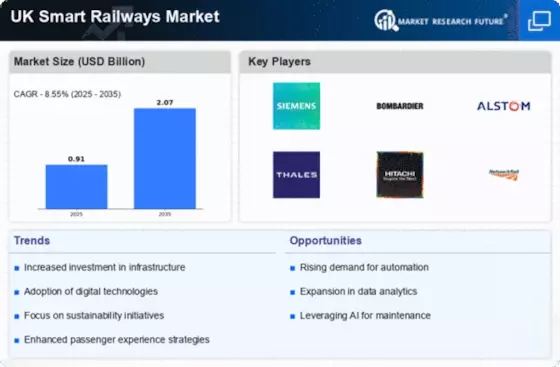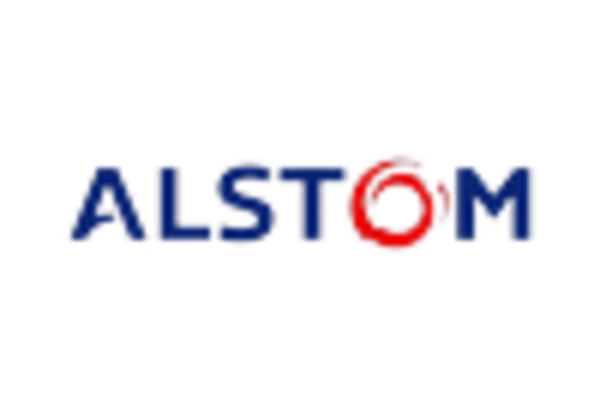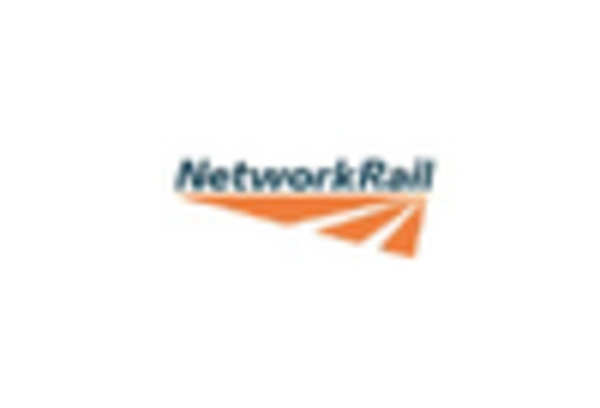Government Initiatives and Funding
The UK Smart Railways Market is significantly influenced by government initiatives aimed at modernizing rail infrastructure. The UK government has committed substantial funding to enhance rail services, with investments exceeding 48 billion GBP planned for the next five years. This funding is directed towards the implementation of smart technologies, including advanced signaling systems and real-time data analytics. Such initiatives not only aim to improve operational efficiency but also enhance safety and reliability across the rail network. The government's focus on integrating smart technologies aligns with its broader transport strategy, which emphasizes sustainability and innovation. As a result, the UK Smart Railways Market is poised for growth, driven by these strategic investments and policies that encourage the adoption of smart railway solutions.
Enhanced Safety and Security Measures
Safety and security are paramount in the UK Smart Railways Market, driving the adoption of advanced technologies. The integration of smart surveillance systems, automated monitoring, and real-time incident reporting is enhancing the safety of rail operations. Recent statistics indicate a decline in rail accidents due to improved safety protocols and technologies. The UK government has prioritized safety in its rail strategy, allocating resources to upgrade infrastructure and implement smart safety solutions. This emphasis on safety not only protects passengers but also builds public trust in rail services. Consequently, the UK Smart Railways Market is likely to see continued investment in safety technologies, ensuring a secure travel environment for all users.
Focus on Environmental Sustainability
The UK Smart Railways Market is increasingly aligning with environmental sustainability goals. The UK government has set ambitious targets to reduce carbon emissions, and the rail sector is seen as a key player in achieving these objectives. The transition to electric and hybrid trains, along with the implementation of energy-efficient technologies, is expected to significantly lower the carbon footprint of rail transport. Recent reports indicate that rail travel produces 76% less carbon dioxide per mile compared to road transport. This focus on sustainability not only meets regulatory requirements but also appeals to environmentally conscious consumers. As a result, the UK Smart Railways Market is likely to benefit from investments in green technologies and practices that promote sustainable rail operations.
Rising Demand for Efficient Transportation
The UK Smart Railways Market is experiencing a surge in demand for efficient and reliable transportation solutions. With urbanization and population growth, the need for effective public transport systems has become increasingly critical. Rail transport is viewed as a sustainable alternative to road travel, and smart technologies are being integrated to enhance service delivery. According to recent data, rail passenger numbers in the UK have reached over 1.7 billion annually, indicating a robust demand for improved services. The implementation of smart ticketing systems and real-time information services is expected to further attract passengers, thereby increasing ridership. This growing demand for efficient transportation solutions is likely to drive innovation and investment in the UK Smart Railways Market, fostering a more connected and responsive rail network.
Technological Advancements in Rail Systems
Technological advancements play a pivotal role in shaping the UK Smart Railways Market. Innovations such as the Internet of Things (IoT), artificial intelligence, and big data analytics are being harnessed to optimize rail operations. For instance, predictive maintenance technologies are being deployed to reduce downtime and enhance safety. The UK government has also initiated projects like the Digital Railway program, which aims to modernize signaling and control systems. These advancements not only improve operational efficiency but also enhance the overall passenger experience. As technology continues to evolve, the UK Smart Railways Market is likely to witness increased investment in smart solutions that facilitate seamless travel and operational excellence.
















